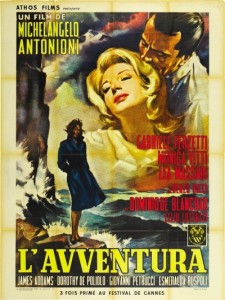September 29 is the centenary of the birth of one of cinema’s legendary directors, Michelangelo Antonioni. Best known for his trilogy on modern life and its discontents – made up of the films L’Avventura, La Notte and Eclipse – Antonioni is credited with redefining narrative film. An iconoclast, he challenged traditional perspectives on film, storytelling, drama, and the modern world.
Antonioni rejected action films in favor of movies that explored introspective characters and created intricate mood pieces. His focus was not on adventure or plot but on images and a movie’s design.
He received numerous awards and nominations for his enigmatic films, including several prizes at Cannes Film Festivals, and the Venice Film Festivals, and an honorary academy award in 1995.
Born in Ferrara in Emilia Romagna, Antonioni was the son of prosperous landlords, Elisabetta and Ismaele. His childhood was a happy one, as he once said in an interview, spent drawing, practicing the violin and playing outdoors, mostly with the children of working class families.
“I always had sympathy for young women of working-class families, even later when I attended university: they were more authentic and spontaneous,” he said in the interview.
After graduating with an economics degree from the University of Bologna, Antonioni became a film journalist with the local newspaper. He later moved to Rome and took a short-lived job with Cinema, the official Fascist film magazine before enrolling at the Centro Sperimentale di Cinematografia to study film technique. Shortly afterwards he was drafted into the Italian army.
Early in his film career, Antonioni produced a series of neorealist short films, some of them semi-documentaries of the lives of common people.
His first full-length movie was Cronaca di un amore (1950), which focused on the middle classes. In Le Amiche (1955), Antonioni introduced an experimental style that used exaggeratedly long takes and disconnected events.
He also used those techniques in L’avventura (1960), which became his first international success, followed by La notte (1961), starring Jeanne Moreau and Marcello Mastroianni, and L’eclisse (1962), starring Alain Delon. Many of the films of this period also star Monica Vitti, Antonioni’s love interest at the time.
Perhaps his most famous film is Blowup (1966), set in London and starring Vanessa Redgrave, which won him Academy Award nominations for Best Director and Best Screenplay.
Zabriskie Point (1970), his first film set in America had a countercultural theme and a soundtrack by popular artists such as Pink Floyd and the Rolling Stones, but was not a critical or commercial success. The Passenger (1975), starring Jack Nicholson and Maria Schneider, received critical praise but also failed at the box office.
Antonioni continued to make films throughout the 80s and 90s and to collect awards, including an honorary academy award in 1994 as “one of the cinema’s master visual stylists.”
Antonioni has had his share of detractors, among them director Ingmar Bergman, who said he considered some of Antonioni’s films as masterpieces for their detached and dreamlike quality, but thought the others were monotonous and questioned why he was held in high esteem.
Antonioni died at age 94 on July 30, 2007 in Rome – the same day that Ingmar Bergman died. He lay in state at Rome’s City Hall; a large screen projected a collage of his life. He is buried in Ferrara.
–Reprinted from Voce Italiana

